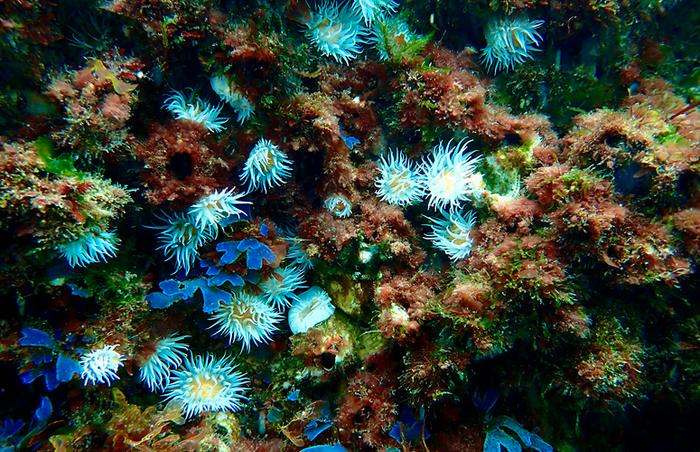The temperature of our planet is rising rapidly. Ninety per cent of the excess heat generated has been absorbed by the sea and, as a result, the surface temperature of the oceans has risen significantly. In this context, immobile and temperature-sensitive organisms are particularly vulnerable.

Credit: 2 (algae). Author: Marine Benthos Research Group, UPV/EHU.
The temperature of our planet is rising rapidly. Ninety per cent of the excess heat generated has been absorbed by the sea and, as a result, the surface temperature of the oceans has risen significantly. In this context, immobile and temperature-sensitive organisms are particularly vulnerable.
In addition, there are places where the warming of the sea is more significant than in others. For example, off the Basque coast there has been a 0.23 °C increase in sea temperature per decade, compared with a global increase of 0.15 °C. Faced with this situation, the UPV/EHU’s Marine Benthos Research Group explored how macroalgae communities in a coastal area off Biscay have been affected by warming. Together with the Blanes Centre for Advanced Research, the group investigated the changes that have taken place over the last 40 years. “It is important to study how macroalgae communities respond to temperature increases in order to preserve marine biodiversity, as they play essential roles in ecosystems,” said biologist Olatz Arriaga-Telleria.
One of the main conclusions drawn is the increase in warm-affinity species in the macroalgae communities off the Basque coast due to the increase in temperature, while cold-affinity ones are becoming less numerous. This has led to profound transformations in community structure, as the species that have declined the most, such as Gelidium corneum, are structuring, i.e. they create three-dimensional environments that provide refuge for a wide variety of organisms. What is more, they provide suitable habitats for other algae, fish, invertebrates, etc., where food and protection from predators, among other things, can be found. “We did not detect other species that are replacing these important ecological functions while the structuring species are in decline, which signifies a degradation of the communities,” Arriaga explained. The warm-affinity species that have proliferated are smaller and more simple in morphological terms.
Resilience of macroalgae communities
The research has also shown that macroalgae communities respond very quickly to changes in sea temperature. This can be deduced from the data over the last decade. In fact, the temperature increase has not been homogeneous over the 40 years analysed. While the general trend has been upward, the most recent period (2014-2020) investigated saw warmer temperatures. Arriaga explained that “this has allowed us to study what the short-term response of the macroalgae communities is like; we saw that over these 6 years the presence of structuring species at great depths, which had been lost, has partially recovered, while some warm-affinity species have decreased”.
Although the resilience displayed by the macroalgae gives rise to some hope, the research team stresses it does not look as if sea temperature control will be taking place right away. And given that temperature is the main cause of structural transformations in macroalgae communities, the team does not envisage an easy future. So they regard continuing the research and increasing the frequency of monitoring as essential: “This would help to better understand the behaviour of the macroalgae communities and to take proactive measures to protect the habitats of vulnerable species.” One example could be to identify the areas with the potential to become climate refugia. They are working to find solutions before the situation becomes irreversible.
Additional information
Olatz Arriaga-Tellería is a biologist and is writing up her PhD thesis with a grant from the Basque Government in the Department of Plant Biology and Ecology at the Faculty of Science and Technology of the UPV/EHU. She belongs to the Marine Benthos Research Group, which studies the impacts of climate change and pollution on macroalgae communities.
Bibliographical reference
O. Arriaga, P. Wawrzynkowski, N. Muguerza, I. Díez, J.M. Gorostiaga, E. Quintano, M.A. Becerro The thermal journey of macroalgae: Four decades of temperature-induced changes in the southeastern Bay of Biscay Marine Environmental Research DOI: 10.1016/j.marenvres.2024.106351
Journal
Marine Environmental Research
Method of Research
Observational study
Subject of Research
Not applicable
Article Title
Rising sea surface temperatures have led to profound changes in macroalgae communities
Article Publication Date
9-Apr-2024



